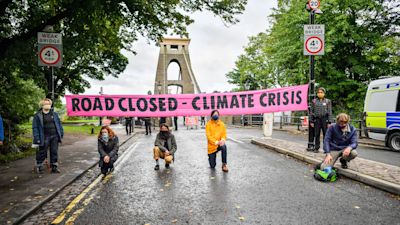Travel disruption expected as Extinction Rebellion plan bank holiday weekend protests

Environmental protest movement Extinction Rebellion (XR) plan to target airports and impose roadblocks during the bank holiday weekend, as it kicks off a new programme of climate emergency demonstrations.
Beginning on Friday, a “regional rebellion” over four days will see protests staged across the country - including in London, Manchester, Birmingham, Bristol, Cardiff and Leeds.
Due to the coronavirus pandemic and its impact on travel, protesters are encouraged to take action locally.
The aviation sector, banks, the fossil fuel industry and petrol stations are all set as targets, on a bank holiday weekend expected to be busy with travellers.
The protests are being held ahead of larger-scale demonstrations planned for London, Manchester and Cardiff on September 1.
Protests this weekend are expected to include roadblocks, marches, sit-ins, bike rides and picnics, with campaigners emphasising their ethos of “non-violent direct action”.
XR supporters will also be encouraged to protest digitally, and urged to phone their MPs and “institutions of power”.
Anneka Sutcliffe, from XR Actions Circle, said a “few thousand” people had indicated on Facebook they would join the London events - but numbers were expected to be lower than at demonstrations held in October.
Converging marches will start from Tate Britain, Trafalgar Square, Buckingham Palace, Westminster Cathedral and Smithfield Market.
Other protests will include a roadblock on Prince Street Bridge in Bristol, a mass bike ride from Brighton to London, banner drops and rallies against the expansion of Luton Airport and the aviation industry at Gatwick Airport.
Avon and Somerset Police said the Clifton Suspension Bridge would close from midnight on Thursday because of the Bristol protest - and could be shut until 6am on Tuesday at the earliest.
Acting Chief Inspector Rob Cheeseman said: “We cannot risk any protest activity impacting on the bridge which is currently used by around 10,000 to 12,000 vehicles every day, in addition to pedestrians and cyclists.
“We know from experience that Extinction Rebellion have engaged in disruptive tactics which have not been disclosed in advance to our liaison officers and we have to take all necessary steps to mitigate the impact this action could have on the safety of the public using the bridge.”
Late on Thursday, XR Youth said two members had blocked the bridge, securing themselves to the structure, and intending to stay there all night.
But police said two women were arrested just before 11pm and the bridge was now closed to vehicles, cyclists and pedestrians.
Dr Chris Newman, a GP and founder of Doctors for XR, told reporters on Thursday they were aware of the health risks of public gatherings and had cancelled previous protest plans.
"Everyone in XR that I’ve spoken to is extremely mindful of the risks and we’re all concerned about health risks. That’s why we’re here, because climate change is a health issue as much as anything," he said.
"So everyone will be pushing very hard for all XR participants to be obeying government rules with social distancing, with them avoiding protests if they’re unwell, or if they have to isolate."
Clare Farrell, a co-founder of the XR movement, said the Covid-19 crisis "has shown us that things can change very, very rapidly when people realise that there is an existential threat to human life and if we took climate change as seriously as this pandemic then we are surely capable of making massive changes very, very rapidly".
The protests will coincide with the government introducing hefty fines for anyone organising gatherings that breach social distancing rules from Friday.
Protesters refuse to back down after four nights on top of City Hall in Bristol
Clifton Suspension Bridge to close ahead of Extinction Rebellion protest